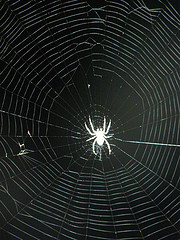The bite or sting of any sort of invertebrate or vertebrate can leave a bruise and soreness as to cause a bite the skin has pressure applied to it and can be broken, which leads to bruising and soreness around that area. There are numerous species of spiders that carry venom and this can get into the blood stream when bitten and can cause soreness, a number of other side effects such as vomiting, fever and faintness, but some spiders venoms are that toxic that they can kill.
But First, A Brief Note On Arachnids!
Arachnids are air-breathing arthropods that have eight legs, and chelicerae with fangs that inject venom. They are the largest order of arachnids and rank seventh in total species diversity among all other groups of organisms. Spiders are found worldwide on every continent except for Antarctica, and have become established in nearly every habitat with the exception of air and sea colonization. As of 2008, approximately 40,000 spider species, and 109 families have been recorded by taxonomists, however, there has been confusion within the scientific community as to how all these families should be classified.
Anatomically, spiders differ from other arthropods in that the usual body segments are fused into two tagmata, the cephalothorax and abdomen, and joined by a small, cylindrical pedicel. Unlike insects, spiders do not have antennae. In all except the most primitive group, the Mesothelae, spiders have the most centralized nervous systems of all arthropods, as all their ganglia are fused into one mass in the cephalothorax. Unlike most arthropods, spiders have no extensor muscles in their limbs and instead extend them by hydraulic pressure.
Their abdomens bear appendages that have been modified into spinnerets that extrude silk from up to six types of silk glands within their abdomen. Spider webs vary widely in size, shape and the amount of sticky thread used. It now appears that the spiral orb web may be one of the earliest forms, and spiders that produce tangled cobwebs are more abundant and diverse than orb-web spiders.
So Why Would Spiders Bite People?
Most spiders will only bite humans in self-defense, and few produce worse effects than a mosquito bite or bee-sting. Most of those with medically serious bites, such as recluse spiders and widow spiders, are shy and bite only when they feel threatened, although this can easily arise by accident. Funnel web spiders' defensive tactics are aggressive and their venom, although they rarely inject much, has resulted in 13 known human deaths. On the other hand the Brazilian wandering spider requires very little provocation.
How Many People Have Been Bitten By Spiders?
There were 100 reliably reported deaths from spider bites in the 20th century, but 1,500 from jellyfish stings. Many alleged cases of spider bites may represent incorrect diagnoses, which would make it more difficult to check the effectiveness of treatments for genuine bites.
But First, A Brief Note On Arachnids!
Arachnids are air-breathing arthropods that have eight legs, and chelicerae with fangs that inject venom. They are the largest order of arachnids and rank seventh in total species diversity among all other groups of organisms. Spiders are found worldwide on every continent except for Antarctica, and have become established in nearly every habitat with the exception of air and sea colonization. As of 2008, approximately 40,000 spider species, and 109 families have been recorded by taxonomists, however, there has been confusion within the scientific community as to how all these families should be classified.
Anatomically, spiders differ from other arthropods in that the usual body segments are fused into two tagmata, the cephalothorax and abdomen, and joined by a small, cylindrical pedicel. Unlike insects, spiders do not have antennae. In all except the most primitive group, the Mesothelae, spiders have the most centralized nervous systems of all arthropods, as all their ganglia are fused into one mass in the cephalothorax. Unlike most arthropods, spiders have no extensor muscles in their limbs and instead extend them by hydraulic pressure.
Their abdomens bear appendages that have been modified into spinnerets that extrude silk from up to six types of silk glands within their abdomen. Spider webs vary widely in size, shape and the amount of sticky thread used. It now appears that the spiral orb web may be one of the earliest forms, and spiders that produce tangled cobwebs are more abundant and diverse than orb-web spiders.
So Why Would Spiders Bite People?
Most spiders will only bite humans in self-defense, and few produce worse effects than a mosquito bite or bee-sting. Most of those with medically serious bites, such as recluse spiders and widow spiders, are shy and bite only when they feel threatened, although this can easily arise by accident. Funnel web spiders' defensive tactics are aggressive and their venom, although they rarely inject much, has resulted in 13 known human deaths. On the other hand the Brazilian wandering spider requires very little provocation.
How Many People Have Been Bitten By Spiders?
There were 100 reliably reported deaths from spider bites in the 20th century, but 1,500 from jellyfish stings. Many alleged cases of spider bites may represent incorrect diagnoses, which would make it more difficult to check the effectiveness of treatments for genuine bites.

